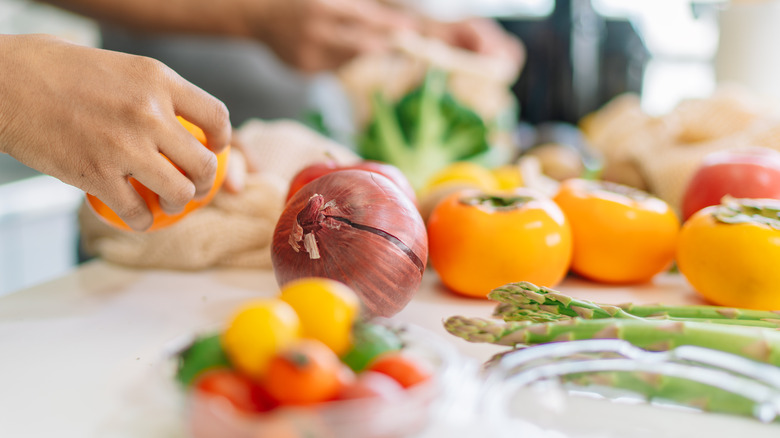Is The 800 Gram Challenge Good For Weight Loss? Our Nutrition Expert Weighs In
Have you ever wondered if you've been incorporating enough fruits and vegetables into your diet? Well, that's precisely what you would do if you tried the 800 gram challenge created by EC Synkowski of OptimizeMe Nutrition.
According to the certified nutrition specialist and licensed dietitian nutritionist, the challenge is not about restricting what you can eat, but adding (as the name suggests) 800 grams of fruits and vegetables (by weight) to your diet every day. You can still continue to eat other things that you enjoy, like protein, snacks, nuts, and healthy fats. On the surface, this looks like a good way to move toward a healthier diet.
But can you use the 800 gram challenge for weight loss? Although the official website doesn't market the concept as a weight loss mechanism, the challenge could help with weight loss, according to Dr. Amy Lee, Head of Nutrition for Nucific, speaking exclusively with Health Digest. In addition to making people aware of just how much fruit and vegetables they're getting in their diet, the 800 gram challenge might push people to meet their dietary requirements, and then some. "In a 2015 report by the CDC, only 1 out of 10 adults consume appropriate levels of fruits and vegetables. The current requirement is 2-3 cups a day depending on the sex; which is really not that much," shared the nutrition expert. Plus, plants are low in calories and high in fiber and water content, which means you'll feel full for longer.
Other benefits of the 800 gram challenge
Science tells you that increasing your plant-based food content could be linked to greater cardiovascular health, a longer life, and weight loss. Even when it comes to keeping your blood sugar and blood pressure levels in check, preventing chronic diseases like cancer, and improving brain and eye health, fruits and vegetables can do a lot for you.
Dr. Amy Lee added that getting in more fruits and vegetables through diets like the 800 gram challenge means you're consuming beneficial vitamins, minerals, and phytochemicals — things you don't get from carbs and protein foods. "Also, the added benefit is natural fiber to help with overall health, gastrointestinal tract, and decreasing inflammation." Vegans and vegetarians aside, a lot of us don't consciously make it a habit to include fruits and vegetables to our three meals every day. Perhaps, challenges of this nature will inspire you to mindfully choose and add vegetables you like to your diet.
Which brings us to another point: The 800 gram challenge is fairly less rules-based when compared with popular diets, ranked worst to best, at least according to EC Synkowski. For example, if you don't like eating kale, you don't have to add this particular vegetable to your diet. There are, however, some rules, like not consuming dried fruits, juices, or products made using fruits. This means popcorn, French fries, bean pasta, and store-bought smoothies can't be included in the challenge.
Some things to keep in mind with the 800 gram challenge
People who've tried the challenge have criticized how weighing your vegetables and fruits can become cumbersome and how suddenly upping your plant-based food content can shock your digestive system (hello, fiber). There is also some concern over just how much fructose consumption is optimal for weight loss. Yes, fruits are good for you, but overconsumption might spell trouble for your blood sugar levels.
On the topic of weighing 800 grams, EC Synkowski helpfully explained that 800 grams roughly amounts to six cups — that's six closed adult fistfuls of fruits and vegetables — that can typically fill one standard dinner plate. But you want to spread this out throughout your day instead of consuming everything in one go. They can be cooked, canned, frozen, or fresh.
Dr. Amy Lee cautioned against forgetting other types of nutritious foods (and their beneficial nutrients and vitamins) required for a balanced diet by just focusing on fruits and vegetables. "By eating a lot more fruits and vegetables, you may feel fuller with your appetite being suppressed, but you do still need to consume a healthy amount of proteins (animal or vegetarian origin) and some carbs/starches so definitely don't forget other food groups," explained the nutrition expert. Even if you're looking for ways to maintain your weight loss, your body needs the nutritious profile of a balanced meal.


